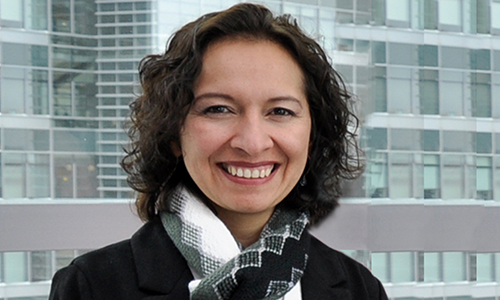Tumor Host Interactions
Tumor Host Interactions Program
The goals of the Tumor Host Interactions (THI) Program are to understand both tumor intrinsic and extrinsic conditions of the host that impact tumor initiation, progression and therapeutic response to harness this information using translational pre-clinical studies and clinical trials. THI investigators use expertise in tumor immunology, the microenvironment, and physiology to understand and exploit tumor/host crosstalk, such as tumor-stroma interactions, tumor infiltrating immune cells, heme- and lymph-angiogenesis, endocrine influences on components of the tumor microenvironment and site-specific niches.
Scientific Goals
Understand interactions between tumor-intrinsic properties and immune recognition. Existing or treatment-driven tumor heterogeneity can facilitate immune evasion and impaired immune recognition. To understand basic mechanisms and translate these into novel therapeutic approaches, members investigate tumor intrinsic properties such as mutational burden, epigenetics, antigen expression/presentation, and tumor metabolism, as they relate to alterations in the immune microenvironment.
Determine the mechanisms by which host physiologic conditions affect the tumor microenvironment (TME) and tumor progression. The profound hormonal and metabolic changes that accompany puberty, pregnancy, and aging, as well as obesity and autoimmunity, have systemic influences that affect the TME. Host conditions such as age, exposures, metabolic status, and lifestyle choices directly and indirectly impact cancer development and progression by creating a permissive micro-environment, altered therapeutic responses, or predisposition to adverse events. Understanding host physiologic and pathologic conditions that influence cancer enables new prevention and treatment strategies.
Develop innovative therapeutic strategies that redirect the immune system and/or exploit tumor/host interactions. The TME is a complex mixture of tissue components including immune cells, blood vessels, stroma, adipocytes and extracellular matrix that create therapeutic challenges and opportunities. Following pre-clinical modeling, promising strategies are tested in clinical trials. Special emphasis is placed on creating the next generation of immune-focused and cellular therapies. THI members partner with the state-of-the-art Gates Biomanufacturing Facility, with a novel public-private model, to defray costs and prioritize investigator-initiated trials (IITs) that serve the people of Colorado and beyond.
Activities
IrAE meeting series: Immune-related adverse events following cancer immunotherapy is common, but poorly understood. THI has organized a mini-symposium series to advance collaborations. A diverse group of immunologists, oncologists, endocrinologists and rheumatologists (consulted to treat irAEs) are invited to speak and attend. The inaugural meeting featured researchers funded in irAEs to present and participate in a panel discussion.
Tumor Immunology Forum: The purpose of this bi-weekly meeting is to bring together the basic immunologists, tumor immunologists, and immunology-curious cancer researchers and clinicians. Through sharing ideas and targeted feedback from diverse perspectives, this forum nurtures creativity, fosters collegiality and learning. These interactive meetings typically start with background, rationale, and big picture goals, and data are strategically picked for audience feedback. Presenters are asked to prepare only 30 min of presentation to ensure plenty of opportunity for feedback and discussion. Mentored members are strongly encouraged to present. This meeting averages 45 attendees.
Multiplex Imaging User Group: This group meets monthly to discuss imaging and analysis related to the technologies and associated experiments offered by HIMSR. HIMSR operates a Vectra instrument that uses immunofluorescence to quantify up to 7 antigens in regions-of-interest, a Vectra Polaris that enables whole-slide quantification, and the Multiplex Ion Beam Imaging (MIBI) that quantifies up to 40 antigens coupled to heavy metal ions in high resolution. Participants actively engage in data presentations, challenges, and peer feedback. Recent topics discussed include high parameter bioinformatic analyses to region selection.
Breast Cancer U54 Planning: A major priority is to increase multi-PI grants among University of Colorado Cancer Center members, to enhance cross-disciplinary and collaborative cancer research.
Genetically modified immune-effector cell working group: With the rising number of investigators turning to genetically modified lymphocytes (T cells, NK cells and monocytes) to target cancer, THI leads a bi-monthly working group discussing preliminary findings, addressing issues of vector design, target identification, transduction methodology, efficacy assays (in vitro and in vivo) and transition to the cGMP facility. On this latter point, members of the cGMP facility will participate and provide guidance. While most of this work is performed in THI member laboratories, the working group is open to all campus members.
Tumor Host Interactions Leadership

Diana Cittelly, PhD
Program Co-Leader
Diana Cittelly, PhD, has been with the University of Colorado Anschutz Campus since 2007, a
CU Cancer Center member since 2013, and is currently an associate professor
in the Department of Pathology. She is a cancer researcher with
multidisciplinary training in neurosciences, hormone-dependent breast
cancer, microRNA biology, cancer stem cell biology, and xenograft models
of breast cancer. Her research program focuses on defining how
interactions between specialized cells within the brain microenvironment
and cancer cells contribute to brain metastatic progression. Also, Cittelly was previously awarded a National Cancer Institute (NCI) Transition Career Development Award to Promote Diversity (K22) award during her time as a postdoctoral fellow in 2013. She was later awarded an Early Stage Investigators (R37) Award from the NCI as well.

Michael Verneris, MD
Program Co-Leader
Michael Verneris, MD, is a Program Co-Leader for THI, and leads the Pediatric Blood and Marrow Transplantation and Cellular Therapy Program at CHCO. He is also the Scientific and Medical Director of the Cellular Therapy Operations Program (CTOP) and reports to the Vice Chancellor of Research. CTOP is tasked with overseeing all aspects of cell therapy clinical trial conduct and has responsibility for all regulatory aspects of cell therapy (IND, IRB, IBC, etc.) on campus. In this capacity he interactions with various campus-wide clinical research regulatory bodies and the good manufacture production (GMP) facility. Over the past 27 years, he has overseen a translational laboratory focusing on Natural Killer (NK) cell and T cell function following transplantation and as cancer therapy, using small molecules (BiTes, BiKes and TriKes) and CARs to redirect NK and T cells to cancer. He is currently funded by NIH 1R01HL155691 to study how NK cells and ILCs develop in people with Down Syndrome given their high risk for leukemia. Additionally he is funded by the V Foundation with Dow (THI) to perform translational CAR T cell studies in dogs with osteosarcoma. He has been an investigator of numerous first in human clinical trials testing transplant approaches, cellular therapy or cytokines. He has >200 publications, an H-Index 58 and >13,000 citations. In the clinic, he is PI of numerous consortia or cooperative group pediatric cancer studies. Verneris is the Vice Chair of the Pediatric Transplantation and Cellular Therapy Consortium, an organization of >100 pediatric BMT centers in the US and internationally. He assists THI investigators with translational aspects of their research and specifically serves as the liaison between THI and the Children’s Hospital. He has been a THI co-lead since the program’s inception (2018).

Jill Slansky, PhD
Program Co-Leader
Jill Slansky, PhD, is a Program Co-Leader for THI. For the last 25 years she has been an investigator in the field of antigen-specific T cell responses against tumors, tumor vaccines, and interactions between tumors and the tumor micro-environment. She runs her lab with NCI and DOD funding and has >60 publications, many focused on basic interactions between the T cell receptor and the peptide-antigen-presenting cell molecule on cancer cells, and collaborative publications focused on other cells in the tumor micro-environment. Currently Slansky is PI on R01 CA226879 focused on identification of unique inhibitory receptors that are functionally enriched in TILs to help establish mechanisms that contribute to development of future therapies for cancer. She also sits on the NCI Cancer Immunopathology and Immunotherapy study section. In addition to her PL role, since 2004, Slansky has co-directed the Blood and Lymph Block, a required class for the first year medical students at CU, and has directed the Human Immune Monitoring Shared Resource (HIMSR) since 2016. Slansky was appointed as Program Co-Leader for THI by Dr. Schulick in 2019. As Program Co-Leader, Slansky is a liaison with the basic scientists in the Department of Immunology and Microbiology and HIMSR, and she hosts the campus-wide Tumor Immunology Forum. Additionally, representing the CU Cancer Center in the Comparative Oncology Research Consortium Steering Committee, she facilitates partnerships with Colorado State University CSU Flint Hospital.